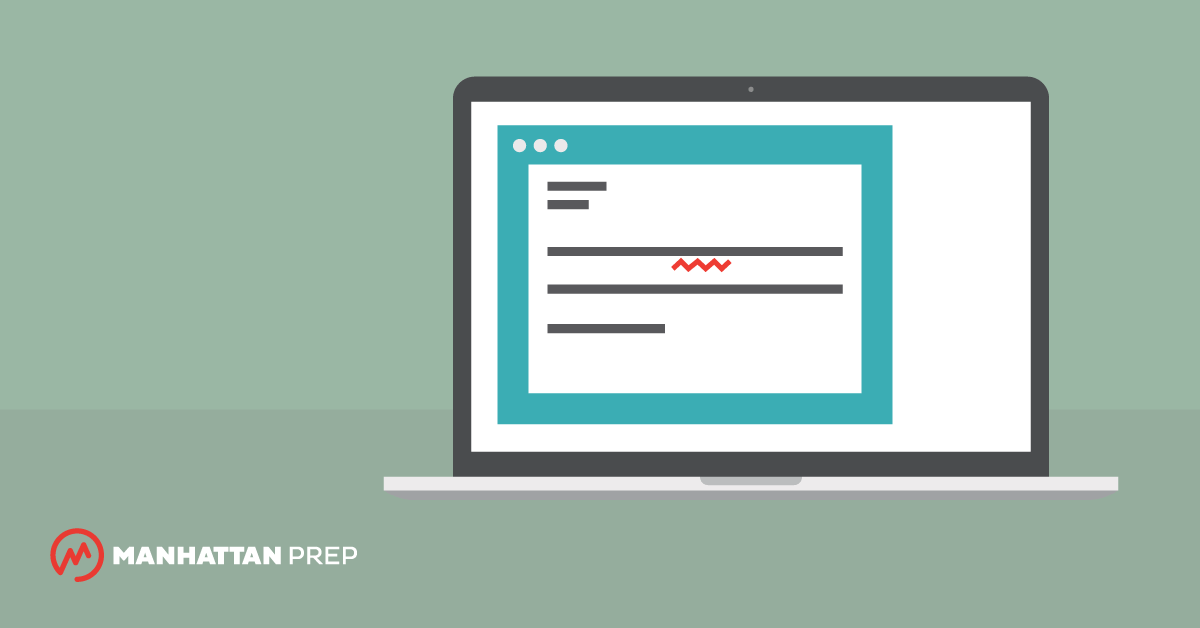Help! I Can’t Handle GMAT Probability and Combinatorics (Part 2)

Did you know that you can attend the first session of any of our online or in-person GMAT courses absolutely free? We’re not kidding! Check out our upcoming courses here.
In the previous article in this series, we introduced two big ideas about GMAT probability and combinatorics:
- Most people find them counterintuitive.
- The best way to get past that is to list the possibilities.
In this article, we’ll focus more on #2. How do you list out the possibilities in a GMAT probability or combinatorics problem? Let’s try it on a simple probability problem. Read more
MBA Admissions Myths Destroyed: Do Alumni Connections Help You Gain Admission?

What have you been told about applying to business school? With the advent of chat rooms, blogs and forums, armchair “experts” often unintentionally propagate MBA admissions myths, which can linger and undermine an applicant’s confidence. Some applicants are led to believe that schools want a specific “type” of candidate and expect certain GMAT scores and GPAs, for example. Others are led to believe that they need to know alumni from their target schools and/or get a letter of reference from the CEO of their firm in order to get in. In this series, mbaMission debunks these and other myths and strives to take the anxiety out of the admissions process.
From time to time, we at mbaMission visit admissions officers at top-ranked business schools, which gives us the opportunity to ask rather frank questions. On one such visit to a prestigious MBA program, we pushed an admissions officer on the extent of alumni connections in the admissions process and ultimately received a surprising response: “We get ten letters each year from [a globally famous alumnus], telling us that this or that MBA candidate is the greatest thing since sliced bread. He gets upset when we don’t admit ‘his’ applicants, but what makes him think that he deserves ten spots in our class?”
Read more
How to Hack GMAT Reading Comprehension: Think Like a Lawyer!

Did you know that you can attend the first session of any of our online or in-person GMAT courses absolutely free? We’re not kidding! Check out our upcoming courses here.
After working with thousands of students, I’ll admit: Reading Comprehension is my least favorite subject to teach. Why? Because unlike Quant or grammar, it doesn’t have concrete rules to apply, so it can be harder to find ways to help when students are struggling.
I have found, though, that many students who struggle with GMAT Reading Comprehension aren’t actually struggling with the “reading” or the “comprehension” part (unless they struggle with English skills generally). No, the passages – though dense and often boring – are mostly ok. It’s answering the questions that’s a struggle!
RC questions can seem vague, and the answer choices can feel like a sphinx’s riddle. Often 2 or 3 answers choices may seem equally right, or maybe none of them seem right! So what should you do? Read more
Should I Get a GMAT Tutor?

Did you know that you can attend the first session of any of our online or in-person GMAT courses absolutely free? We’re not kidding! Check out our upcoming courses here.
“Do you think I should get a GMAT tutor? Is it worth it?” As a GMAT teacher, I hear these questions often and I’ve realized that they tend to come at three specific times during class. I have a few hypotheses as to why these questions come up at these particular times, and some suggestions for you if you share these concerns. Read more
Mission Admission: Start Early on Your MBA Resume

Mission Admission is a series of MBA admission tips from our exclusive admissions consulting partner, mbaMission.
We at mbaMission try to encourage business school candidates to get as much “noise” out of the way as possible before the schools begin releasing their essay questions for the next admissions season. We want our applicants to have the freedom to reflect on their experiences, formally and thoroughly brainstorm, choose ideas, prepare outlines, and then focus on crafting powerful essays. Essentially, we want them to be unfettered as they engage in what is, for many, one of the most significant creative challenges they will ever face. Read more
Practicing Sets of GMAT Problems: Mimic the Real Test (Part 2 of 3)

Guess what? You can attend the first session of any of our online or in-person GMAT courses absolutely free—we’re not kidding! Check out our upcoming courses here.
Last time, we talked about all of the basics of creating practice problem sets. Today, we’re going to talk about how to create larger sets that really mimic the GMAT testing experience. (If you haven’t read the first part yet, do start there.)
What are my goals for these larger sets of GMAT problems?
When you’ve made it through your primary review of all study materials (all question types and content areas), you’re ready to start doing larger problem sets: 8, 12, 16. (I’ll tell you later why these are all multiples of 4.)
Your goal is two-fold:
—Test (and continue to build) your skills on all this stuff you’ve been studying.
—Practice your overall business-decision-making skills (in other words, practice under conditions that mimic the real GMAT as closely as possible). Read more
Your Dream MBA: 5 Steps to Getting In – Free Webinar Series Featuring Columbia and Yale
 Manhattan Prep is teaming up with our friends at mbaMission to cover every base in helping you prepare for the 2017-2018 MBA admissions season. Join us for a free, five-part webinar series, Your Dream MBA: 5 Steps to Getting In. Get expert advice from our test prep masters on how to approach your prep in order to maximize your score, learn all the nuances of MBA applications and admissions from mbaMission’s Senior Consultants, and participate in a Q&A session with admissions officers from Yale, Columbia, and other top b-schools.
Manhattan Prep is teaming up with our friends at mbaMission to cover every base in helping you prepare for the 2017-2018 MBA admissions season. Join us for a free, five-part webinar series, Your Dream MBA: 5 Steps to Getting In. Get expert advice from our test prep masters on how to approach your prep in order to maximize your score, learn all the nuances of MBA applications and admissions from mbaMission’s Senior Consultants, and participate in a Q&A session with admissions officers from Yale, Columbia, and other top b-schools.
Help! I Can’t Handle GMAT Probability and Combinatorics (Part 1)

Did you know that you can attend the first session of any of our online or in-person GMAT courses absolutely free? We’re not kidding! Check out our upcoming courses here.
There’s a classic brain teaser called the Monty Hall problem. It’s named after the host of an old-timey TV game show, who used it to confound contestants. He’d present each contestant with three closed doors. Behind one door was a new car, and behind the other two doors were goats.
Monty invited the player to pick one of the three doors. Whichever door the player chose, Monty would then open a different one, revealing a goat, not the car. Then, he would offer the player a choice. If the player wanted, he could switch doors, picking the other unopened door. Or, he could stick with the door he picked in the first place. Whichever decision he made, he would win the prize behind the door he chose. Read more
MBA Admissions Myths Destroyed: Yikes, a Typo – I Am Done!

What have you been told about applying to business school? With the advent of chat rooms, blogs and forums, armchair “experts” often unintentionally propagate MBA admissions myths, which can linger and undermine an applicant’s confidence. Some applicants are led to believe that schools want a specific “type” of candidate and expect certain GMAT scores and GPAs, for example. Others are led to believe that they need to know alumni from their target schools and/or get a letter of reference from the CEO of their firm in order to get in. In this series, mbaMission debunks these and other myths and strives to take the anxiety out of the admissions process.
You have worked painstakingly on your application. You have checked and rechecked your work. You finally press the Submit button only to discover—to your horror—that you are missing a comma and you inadvertently used “too” instead of “to.” The admissions committee is just going to throw your application out, right? Wrong. Read more
GMAT Grammar: Changing the Subject

Did you know that you can attend the first session of any of our online or in-person GMAT courses absolutely free? We’re not kidding! Check out our upcoming courses here.
Subject-verb agreement is fundamental to correct sentence construction. It’s commonly tested on the GMAT, but is overlooked far too often. Today, we’re going to focus on the subject of the sentence in GMAT grammar.
The subject is the actor of the sentence. It performs the action described by the verb. For simplicity’s sake, I’m going to use “subject” to mean the main subject of the sentence, used in an independent clause, though, of course, a sentence can contain multiple actors/subjects. For example: Read more